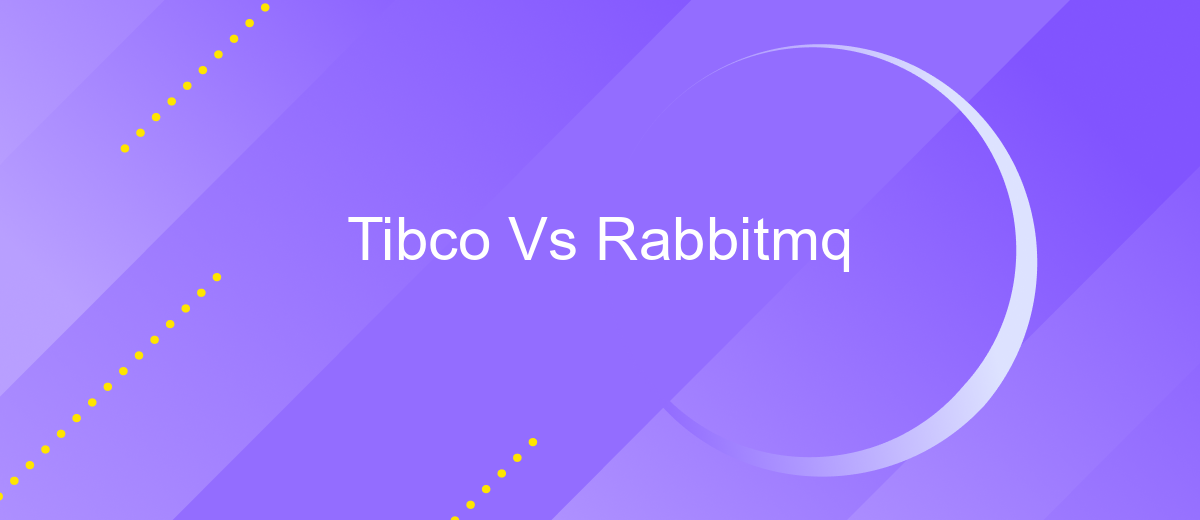Tibco Vs Rabbitmq
In the realm of enterprise messaging systems, Tibco and RabbitMQ stand out as prominent contenders, each offering unique features and capabilities. This article delves into a comparative analysis of Tibco and RabbitMQ, examining their performance, scalability, ease of use, and integration capabilities. By understanding the strengths and weaknesses of each, businesses can make informed decisions tailored to their specific messaging needs.
Introduction
In today's fast-paced digital landscape, efficient message brokering and integration solutions are essential for seamless communication between different systems. Tibco and RabbitMQ are two prominent players in this domain, each offering unique features and capabilities to cater to diverse business needs.
- Tibco: Known for its robust enterprise integration, Tibco provides comprehensive solutions for real-time data distribution and analytics.
- RabbitMQ: An open-source message broker that excels in simplicity and flexibility, RabbitMQ is widely adopted for its lightweight and easy-to-deploy architecture.
Choosing the right message broker can significantly impact your system's performance and scalability. For businesses seeking to streamline their integration processes, tools like ApiX-Drive offer an added advantage by simplifying the setup and management of various integrations. This comparative analysis will delve into the strengths and weaknesses of Tibco and RabbitMQ, helping you make an informed decision tailored to your specific requirements.
Comparison of Features

When comparing Tibco and RabbitMQ, it's essential to evaluate their core features. Tibco offers a comprehensive suite of integration tools, including Tibco BusinessWorks and Tibco EMS, which allow for seamless integration across various platforms and applications. Tibco's robust event-driven architecture and support for complex event processing make it ideal for large-scale enterprise deployments. In contrast, RabbitMQ is a lightweight, open-source message broker that excels in simplicity and ease of use. It supports multiple messaging protocols and is highly extensible, making it suitable for microservices and distributed systems.
Both Tibco and RabbitMQ provide reliable message delivery and fault tolerance, but their approaches differ. Tibco's enterprise-grade solutions come with advanced features like transaction management and built-in monitoring tools. On the other hand, RabbitMQ's strength lies in its flexibility and the ability to integrate with various third-party tools, such as ApiX-Drive, which simplifies the setup of integrations between RabbitMQ and other services. Ultimately, the choice between Tibco and RabbitMQ depends on the specific needs and scale of the project, with Tibco being more suited for complex, large-scale environments and RabbitMQ for simpler, agile deployments.
Advantages

When comparing Tibco and RabbitMQ, both platforms offer distinct advantages that cater to different business needs and technical requirements. Tibco, known for its robust integration capabilities, excels in environments where complex workflows and enterprise-level data integration are crucial. RabbitMQ, on the other hand, shines in scenarios demanding high throughput and low latency messaging.
- Scalability: Tibco's architecture supports seamless scaling across large enterprises, while RabbitMQ's distributed messaging system ensures reliable message delivery even under heavy loads.
- Flexibility: Tibco offers extensive customization options for integration processes, whereas RabbitMQ provides a lightweight and flexible messaging protocol suitable for various applications.
- Integration: Tibco's comprehensive suite of tools, combined with services like ApiX-Drive, simplifies the integration of disparate systems, whereas RabbitMQ's compatibility with numerous programming languages and frameworks makes it a versatile choice for developers.
- Performance: RabbitMQ is optimized for high performance in real-time messaging, while Tibco ensures robust performance in complex, transactional environments.
Ultimately, the choice between Tibco and RabbitMQ depends on the specific needs of your organization. For enterprises requiring sophisticated integration solutions, Tibco is a strong contender. However, for applications focused on efficient and scalable messaging, RabbitMQ is often the preferred option.
Disadvantages

When comparing Tibco and RabbitMQ, it's essential to consider their disadvantages to make an informed decision. Both platforms have their unique drawbacks that could impact their suitability for specific use cases.
Tibco, while powerful, can be quite complex and costly for smaller organizations. Its extensive feature set often comes with a steep learning curve, requiring specialized knowledge and training. Additionally, the licensing fees can be prohibitive for startups or small businesses.
- High cost of ownership due to licensing fees
- Steep learning curve requiring specialized training
- Complex integration process
On the other hand, RabbitMQ, though more accessible, may struggle with high throughput scenarios. It lacks some advanced features found in Tibco, which can limit its effectiveness in large-scale enterprise environments. For seamless integration, services like ApiX-Drive can be beneficial, but they might add additional costs and complexity.
Conclusion
In conclusion, both Tibco and RabbitMQ offer robust solutions for message-oriented middleware, each with its own set of strengths. Tibco excels in enterprise-level integration with its comprehensive suite of tools, making it ideal for complex, large-scale environments. On the other hand, RabbitMQ stands out for its simplicity, flexibility, and strong community support, making it a popular choice for smaller projects and startups.
When choosing between Tibco and RabbitMQ, it's important to consider your specific needs and resources. For organizations that require extensive integration capabilities and enterprise-level support, Tibco might be the better choice. However, for those looking for a cost-effective, easy-to-deploy solution, RabbitMQ is a strong contender. Additionally, services like ApiX-Drive can further simplify the integration process by providing seamless connectivity between various applications, enhancing the overall efficiency of your messaging system.


FAQ
What are the primary differences between Tibco and RabbitMQ?
Which one is easier to set up and configure, Tibco or RabbitMQ?
Can Tibco and RabbitMQ be integrated with other systems easily?
What are the scalability options for Tibco and RabbitMQ?
Are there any services that can help automate and configure integrations for Tibco and RabbitMQ?
Time is the most valuable resource in today's business realities. By eliminating the routine from work processes, you will get more opportunities to implement the most daring plans and ideas. Choose – you can continue to waste time, money and nerves on inefficient solutions, or you can use ApiX-Drive, automating work processes and achieving results with minimal investment of money, effort and human resources.

